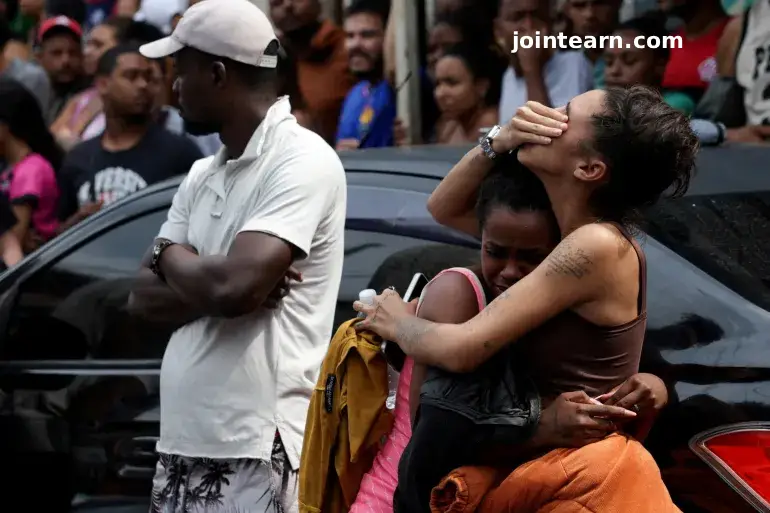
In one of Brazil’s deadliest police operations in recent history, at least 119 people were killed during a large-scale raid on drug traffickers in Rio de Janeiro, officials confirmed Wednesday. The death toll—already staggering—is expected to rise as authorities continue to recover bodies from the Penha and Alemão favela complexes.
According to police reports, 115 alleged gang members and four police officers were killed in the military-style operation that targeted Comando Vermelho (Red Command), Rio’s most powerful criminal organization.
However, Rio’s state public defender’s office put the number even higher—132 dead—sparking nationwide outrage and international condemnation.
Lula ‘Horrified’ by Scale of Operation
Brazilian President Luiz Inácio Lula da Silva said he was “horrified” after learning the extent of the bloodshed. Justice Minister Ricardo Lewandowski stated that the federal government had not been informed in advance about the operation and would seek clarification from Rio state authorities.
“The President is deeply shocked by the scale of fatalities,” Lewandowski said. “We must ensure that police actions respect human rights and the rule of law.”
The United Nations echoed the call for accountability. UN Secretary-General António Guterres urged Brazil to conduct a prompt and transparent investigation, emphasizing that all law enforcement operations must comply with international human rights standards.
Witnesses Describe “Massacre” in the Favelas
The raid, involving more than 2,500 heavily armed police officers, began before dawn Tuesday and lasted for hours. It focused on northern Rio’s Penha Complex and the neighboring Alemão Complex, areas long controlled by organized crime groups.
Residents described scenes of terror as gunfire and explosions echoed through the narrow streets.
“The state came to massacre; it wasn’t an operation,” said a woman from Penha. “They came to kill, to take lives.”
Local activist Raul Santiago, 36, reported that “many victims were executed, shot in the back of the head or the back. This cannot be considered public safety.”
Photographs from the aftermath showed bodies covered in white sheets, as mourners gathered to identify loved ones. Rights organizations, including Amnesty International Brazil, condemned what they called a pattern of police violence disproportionately affecting poor and Black communities in Rio’s favelas.
Officials Defend Raid as Anti-Terror Operation
Rio de Janeiro’s Governor, Cláudio Castro, defended the operation, insisting that those killed were “criminals” engaged in narcoterrorism, not civilians.
“The clashes took place mainly in a wooded area,” Castro told reporters. “The only true victims were the police officers.”
In a statement on X (formerly Twitter), Castro described the raid as a necessary response to “extraordinary levels of armed criminal activity”, accusing gangs of using explosive-laden drones and hijacked buses to fight back against security forces.
“This is not ordinary crime—it’s narcoterrorism,” he wrote.
Background: Violence and Policing in Rio’s Favelas
Deadly police raids are tragically common in Rio de Janeiro’s sprawling urban communities. In 2024 alone, around 700 people died during police operations, according to the state’s Institute of Public Security—an average of two deaths every day.
Critics argue that Rio’s aggressive policing strategy prioritizes lethal force over community safety and fails to address the deep-rooted social and economic causes of gang violence.
The Comando Vermelho, one of Brazil’s oldest and most powerful cartels, controls much of Rio’s drug trade and has been linked to weapons smuggling, extortion, and territorial conflicts. Police say the group has increasingly adopted military-style tactics, including booby traps and drones, to resist raids.
Timing Sparks Controversy
The timing of the operation has raised questions among analysts and rights groups. The raid occurred just days before Rio hosts the C40 World Mayors Summit and Prince William’s Earthshot Prize ceremony—two major international events expected to draw global attention.
Later in November, Brazil will also welcome world leaders to the United Nations Climate Summit (COP30) in Belém, in the Amazon region.
State Security Chief Victor Santos denied any connection between the raid and the upcoming events.
“The elevated lethality was expected but not desired,” Santos said. “The operation was planned long before these international meetings.”
Growing Calls for Accountability
Human rights organizations and local advocacy groups are demanding a federal investigation into what they call a massacre and possible extrajudicial killings. The Brazilian Bar Association (OAB) and Human Rights Watch have both urged the Lula administration to suspend large-scale police raids until independent oversight mechanisms are strengthened.
International observers warn that the tragedy could undermine Brazil’s global image ahead of COP30, where President Lula is expected to highlight his government’s commitment to human rights and sustainable development.
A City Grieving
As families continue to identify the dead, Rio de Janeiro remains tense. The narrow alleyways of Penha and Alemão are lined with candles, flowers, and banners demanding justice. Community leaders say they fear further clashes as anger mounts.
“We are used to hearing gunfire,” said a resident named Fernanda. “But this time, it was like a war.”
For many Brazilians, the bloodshed has reignited the debate over how far the state should go in its fight against organized crime—and at what cost.


Leave a Reply